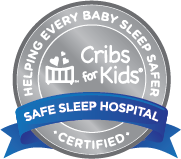
Infant Safe SleepSafe Sleep Certified Hospital Silver Logo
National Safe Sleep Certification Program
BCMC is a silver-level safe sleep hospital that has been certified by Cribs for Kids for the National Infant Safe Sleep Hospital Certification Program. This means that the hospital put into place policies and procedures for the safe sleep of infants less than one year of age. BCMC provides education and training to healthcare team members on a yearly basis to be able to identify, educate, teach, and train families and caregivers about safe sleep for children and infants less than one year of age.
According to the Centers for Disease Control (CDC), there are about 3,400 sleep-related deaths among babies each year in the United States.
In 2022, the American Academy of Pediatrics (AAP) updated the recommendations for infant safe sleep. These guidelines are supported by the CDC and Cribs for Kids.
1. Back to sleep for every sleep including naps.
2. Always use a firm, flat, non-inclined sleep surface. Do not raise the head of the bed for infants.
3. Breastfeeding is recommended because it is associated with a reduced risk of Sudden Infant Death Syndrome (SIDS). Breastfeed for at least 2 months, exclusively for 6 months to 1 year or beyond.
4. Room Sharing NOT bed sharing with the infant is recommended. The infant should sleep on a separate surface designed for infants for at least the first 6 months within the parents' room.
5. Keep soft objects, such as pillows, toys, blankets, mattress toppers, quilts, or fur-like materials, to reduce the risk of SIDS, suffocation, entrapment, wedging, and strangulation. AVOID all objects in the crib and weight blankets.
6. Once breastfeeding is established offering a pacifier during sleep is recommended to reduce the risk of SIDS.
7. AVOID smoke, nicotine, alcohol, marijuana, opioids, and other illicit drugs during pregnancy and after birth.
8. AVOID overheating and head covering in infants. Discontinue infant hat use once the temperature is stable. Temperature stabilization usually occurs a few hours after birth.
9. It is recommended that pregnant people obtain regular prenatal care.
10. It is recommended that infants be immunized in accordance with AAP and CDC guidelines.
11. Do NOT use monitors as a strategy at home to reduce the risk of SIDS.
12. Tummy time is recommended when the infant is awake and supervised. Tummy time may begin after hospital discharge for short periods of time and slowly increase time. At 7 weeks of age, the total tummy time should be 15 to 30 minutes a day which is divided out throughout the day.
13. AVOID commercial devices that are not consistent with safe sleep recommendations.
14. There is no evidence that swaddling reduces the risk of SIDS.
a. Proper swaddling should allow the hips to be flexed and abducted.
b. Discontinue swaddling once the infant shows signs of rolling.
15. AVOID tucking blankets across the infant and under the mattress.
16. DO NOT elevate the head of the bed if your infant has gastroesophageal reflux or GERD.
BCMC promotes and recommends supervised skin-to-skin to all mothers and infants immediately following birth for at least one hour if the mother and infant are medically stable.
BCMC is available to provide safe sleep education to any person wishing for more information. Contact 226-4328.
Please visit these sites for more resources on how to make sure your baby sleeps safely.
→ CribsForKids.org
→ Safe to Sleep (NIH)
→ Charlie's Kids Videos
→ SafeKids.org
→ Interactive Safe Sleep Environment Tool
→ American Academy of Pediatrics




